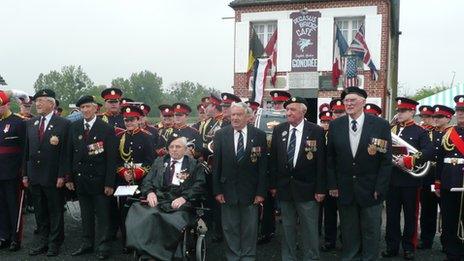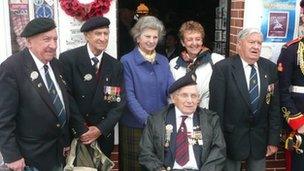Jersey D-Day veterans return to Pegasus Bridge
- Published

Jersey veterans have revisited Pegasus Bridge almost 68 years after the D-Day landings
Members of the Jersey Normandy Veterans Association have revisited former World War II battlefields nearly 68 years after the D-Day landings.
The taking of Pegasus Bridge in a daring operation by British troops who landed in gliders and by parachute was a key moment in the war.
Jersey veteran Clive Kemp landed just a few miles north of there, on Sword Beach, and drove through German lines to get to the bridge.
He was an engineer whose job it would be to build a second bridge nearby.
It was there the veterans chose to have their march past, but instead of visiting on the anniversary of D-Day itself - 6 June - they made their trip a little earlier to avoid the crowds.
They marched across the bridge with the Band of the Island of Jersey.
Drinks followed in the Cafe Gondree - which was the first building to be liberated by the Allies - while the band played a concert outside in the pouring rain.
The veterans said it was wonderful to be able to return, 68 years on.
'Little black dots'

The veterans had drinks in the Cafe Gondree which was the first building liberated in the D-Day landings
Clive Kemp said he remembered going to the Cafe Gondree while he was working on the nearby bridge.
He recalled giving sweets to the owner's daughter, Arlette, who now runs it.
"It hasn't changed inside," he said. "I was billeted in a foxhole just down the road at the chateau, and we used to come up here for a drink and to chat with the Gondrees.
"I remember Madame Gondree when she was just four years old, and I love coming back to visit her."
Mr Kemp brought Arlette a photograph of the two of them at Buckingham Palace, taken during a garden party three years ago.
Among the others who made the trip were Fred Newton and Harry Fenn. They recalled being offshore in boats when the landings were taking place.
Mr Newton remembered all the marines who he had helped ferry them to shore, while Mr Fenn described the beach being covered in "little black dots", which he later realised were bodies.
- Published31 October 2011